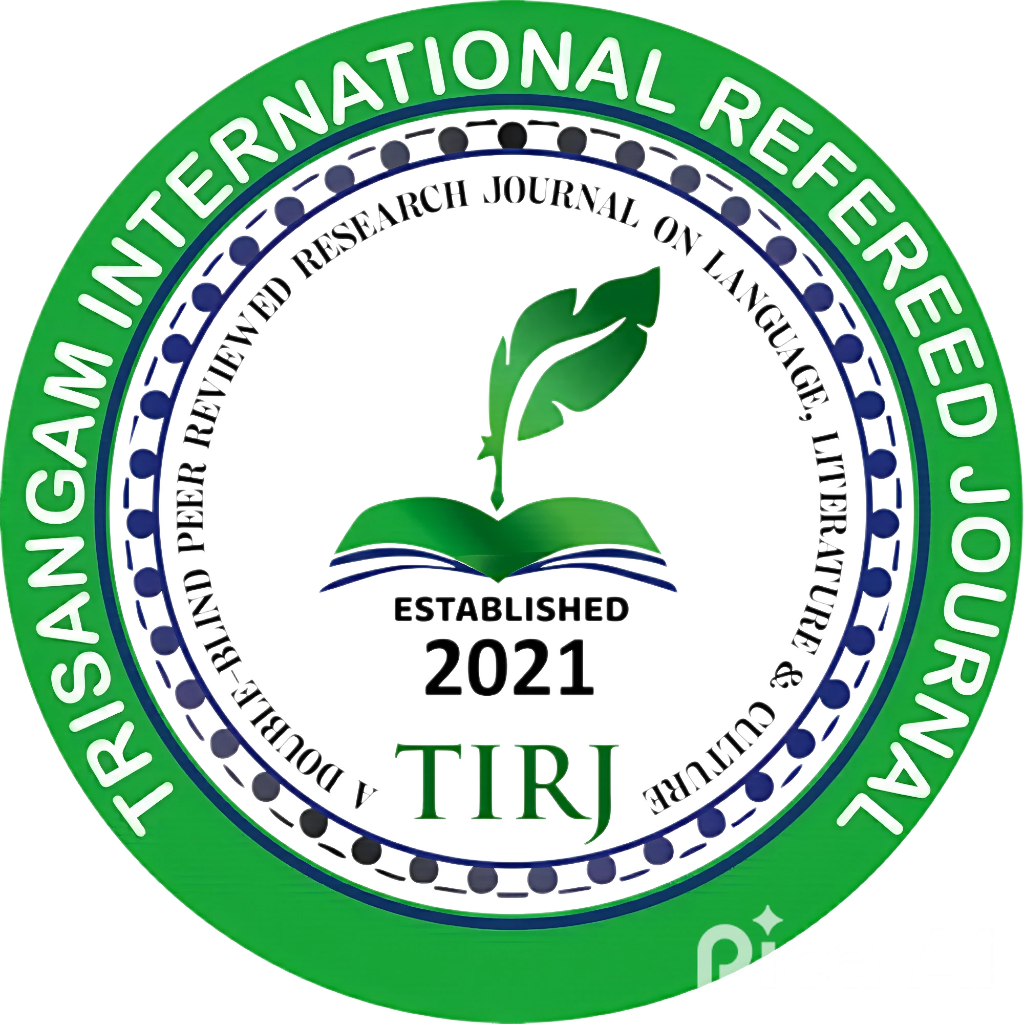The Reflection of Communal Harmony in Sarat Chandra Chattopadhyay’s Literature: An Analytical Study/ শরৎচন্দ্র চট্টোপাধ্যায়ের সাহিত্যে সাম্প্রদায়িক সম্প্রীতির প্রতিফলন : একটি বিশ্লেষণ
Keywords:
- Communalism,
- Secularism,
- Communal Award or MacDonald Award,
- Hindu-Muslim Unity,
- Religious Intolerance,
- Religious Fanaticism,
- Two-Nation Theory
Abstract
Sarat Chandra Chattopadhyay is one of the legendary authors in Bengali literature, whose works consistently address socio-economic disparities, the establishment of women's rights, and above all, the promotion of humanitarian values and communal harmony. A closer analysis of his writings reveals that during the first half of the 20th century, when British imperialism exacerbated communal tensions and disrupted life in India, Sarat Chandra endeavoured through his literature to foster Hindu-Muslim unity, religious tolerance, and mutual respect.
His personal life and his novels and short stories show him as a devout humanitarian who believed that service to the nation was the true religion, transcending narrow religious divisions. His anti-communal stance and mind-set are evident in every aspect of his literary work. He sensitively discussed communal conflicts and emphasized the urgent need to resolve them. However, it is surprising that certain so-called "progressive" literary critics of our country did not recognize his worth. Instead, they labelled him as "conservative," a "staunch Hindu," "anti-Islam," or even "Muslim-hater" and "communal." These critics cited various statements by Sarat Chandra to support their claims.
The purpose of this research paper is to examine from a historical perspective how justified it is to accuse Sarat Chandra of being ‘communal’ or ‘anti-Muslim’ and to assess the validity of such statements within the political context of his time. Furthermore, this research will explore how Sarat Chandra's literary works reflected communal harmony, the historical context behind his writings, and how he encouraged people to transcend religious boundaries and embrace unity through his literary creations.
Downloads
References
১. Chandra, Bipan. Communalism in Modern India, New Delhi, Vani Educational Books, 1954, p.1
২. চন্দ্র, বিপান. আধুনিক ভারত ও সাম্প্রদায়িকতাবাদ, কলকাতা-১২, কে পি বাগচী অ্যান্ড কোম্পানি, ১৯৮৯, পৃ. ১
৩. ঠাকুর, রবীন্দ্রনাথ. ‘কালান্তর’, রবীন্দ্র রচনাবলী, প: ব: সরকার, জন্মশতবর্ষ সংস্করণ, বিশ্বভারতী, ১৯৬১, পৃ. ২৪০
৪. চট্টোপাধ্যায়, শরৎচন্দ্র. ‘বর্তমান রাজনৈতিক প্রসঙ্গ’, শরৎচন্দ্র রচনাবলী (তৃতীয় খণ্ড), পৃ. ৮৮৪
৫. প্রাগুক্ত
৬. চট্টোপাধ্যায়, শরৎচন্দ্র. ‘বর্তমান হিন্দু-মুসলমান সমস্যা’, শরৎচন্দ্র রচনাবলী (তৃতীয় খণ্ড), পৃ. ৮৬০
৭. Chatterjee, Joya. Bengal Divided: Hindu Communalism and Partition (1932-1947), Cambridge, Cambridge University press, 1994, P. 271
৮. শারদীয় নন্দন, ১৩৮২
৯. সরকার, সুমিত. আধুনিক ভারতঃ ১৮৮৫-১৯৪৭, কলকাতা-১২, কে পি বাগচী অ্যান্ড কোম্পানী, ২০০৪, পৃ. ১৯৯
১০. বন্দ্যোপাধ্যায়, শেখর. পলাশি থেকে পার্টিশান আধুনিক ভারতের ইতিহাস, অনুবাদ কৃষ্ণেন্দু রায়, ওরিয়েন্ট লংম্যান, দিল্লী, ২০০৪, পৃ. ৩৯৭
১১. Pandey, Gyanendra. The Construction of Communalism in Colonial North India, Oxford University Press, Delhi, 1992, p. 234
১২. ত্রিপাঠী, অমলেশ. স্বাধীনতা সংগ্রামে ভারতের জাতীয় কংগ্রেস (১৮৮৫-১৯৪৭), কলকাতা, আনন্দ পাবলিশার্স প্রাইভেট লিমিটেড, ২০০৬, পৃ. ১৩৩
১৩. Sarkar, Sumit. Modern India (1985-1947), Delhi, Mackmillan, 1983, p. 237
১৪. চট্টোপাধ্যায়, শরৎচন্দ্র. ‘বর্তমান হিন্দু মুসলিম সমস্যা’, শরৎ রচনাবলী (তৃতীয় খণ্ড), পৃ. ৮৬০
১৫. ‘বুলবুল’, মাসিক পত্রিকা, আষাঢ় ১৩৪৩
১৬. ঠাকুর, রবীন্দ্রনাথ. লোকহিত, ‘কালান্তর’, রবীন্দ্র রচনাবলী (12-শ খণ্ড), বিশ্বভারতী, পৌষ ১৪১৫, পৃ. ৫৬৩
১৭. ব্যতিক্রম ছিলেন বদরুদ্দীন তায়েবজী, আর. এস. সায়ানি, এ. ভিমজি, হামিদ আলি খাঁ প্রমুখ। তাঁরা জাতীয় কংগ্রেসের সক্রিয় সদস্য ছিলেন এবং ভারতের জাতীয় আন্দোলনে গুরুত্বপূর্ণ ভূমিকা নিয়েছিলেন। তায়েবজী ১৮৮৭ সালে এবং সায়ানি ১৮৯৪ সালে কংগ্রেসের সভাপতির পদ অলঙ্কৃত করেছিলেন।
১৮. বন্দ্যোপাধ্যায়, শেখর. পলাশি থেকে পার্টিশান আধুনিক ভারতের ইতিহাস, অনুবাদ কৃষ্ণেন্দু রায়, ওরিয়েন্ট লংম্যান, দিল্লী, ২০০৪, পৃ. ৩৯৬
১৯. Sen, Sachin. The Birth of Pakistan, General Printers & Publication, 2007, p. 42
২০. Hunter, William Wilson. The Indian Musalmans, London, Trubner and Company, 1876, p. 70-82
২১. এই মতবাদ সম্পর্কে বিশদ আলোচনার জন্য দ্রষ্টব্যঃ W. C. Smith, Modern Islam in India, London, 1943; A. R. Desai, Social Background of Indian Nationalism, Bombay, 1948; Abdul Hamid, Muslim Separatism in India : A Brief Survey, Lahore, 1967 ইত্যাদি।
২২. ‘বর্তমান হিন্দু-মুসলমান সমস্যা’, শরৎচন্দ্র রচনাবলী (তৃতীয় খণ্ড), পৃ. ৮৬১
২৩. দেবদাস, ননীগোপাল. ভারতের স্বাধীনতা সংগ্রাম কালানুক্রমিক ঘটনাপঞ্জী (১৬০০-১৯৪৭), কলকাতা, আনন্দ পাবলিশার্স, ১৯৯৯. পৃ. ৪৫-৫২
২৪. গুহ, রায়, সিদ্ধার্থ. ও চট্টোপাধ্যায়, সুরঞ্জন. আধুনিক ভারতবর্ষের ইতিহাস ১৭০৭-১৯৬৪, কলকাতা, প্রগ্রেসিভ পাবলিশার্স, ২০০৯, পৃ. ৬৯৪
২৫. Majumdar, Dr. R.C. History of the Freedom Movement in India (vol. III), South Asia Books Publishers, 1988, P. 424
২৬. বর্তমান হিন্দু-মুসলমান সমস্যা, শরৎ রচনাবলী (তৃতীয় খণ্ড), পৃ. ৮৫৮
২৭. এলবার্ট হলে সভাপতির ভাষণ: ‘বাতায়ন’ ১৫-ই শ্রাবণ ১৩৪৩ বঙ্গাব্দ।
২৮. প্রাগুক্ত
২৯. সেন, সুজিত. ‘সাম্প্রদায়িকতা রবীন্দ্র ভাবনার একটি দিক’, সুজিত সেন (সম্পা.), ভারতে সাম্প্রদায়িকতা বিভিন্ন দৃষ্টিকোণ, প্রগতিশীল প্রকাশন, বৈশাখ ১৪১৯, পৃ. ৬৮
৩০. ঠাকুর, রবীন্দ্রনাথ. কালান্তর, বিশ্বভারতী, ১৯৬১, পৃ. ৬-৮
৩১. রায়, গোপালচন্দ্র. শরৎচন্দ্র, কলকাতা, আনন্দ প্রকাশন, প্রথম আনন্দ সংস্করণ এপ্রিল ২০০৩
পৃ. ১৬৫ [শরৎচন্দ্র ২৯-৬-১৯১৬ তারিখে তাঁর পুস্তকের প্রকাশক হরিদাস চট্টোপাধ্যায়কে এক পত্রে লিখেছিলেন— “... জানেন বোধ হয় আমার ভাগ্নীর বিয়ে এই শুক্রবারের পরের শুক্রবার। তাতে আমারই সমস্ত দায়। আবার আমি আপনার দায়। এতদিন কথাটা আপনাকে বলিনি যে দেশে আমি ‘একঘরে’ আমার কাজকর্মের বাড়ীতে যাওয়া ঠিক নয়...।” ওই সমই শরৎচন্দ্র বাজে শিবপুরে বাস করতেন এবং মাঝে মাঝে দিদি অনিলা দেবীর বাড়ীতে বেড়াতে যেতেন। এখানে চিঠিতে ‘দেশে আমি একঘরে’ বলতে লেখক তাঁর দিদিদের গ্রাম এবং তার আশে পাশের গ্রাম গুলির কথাই বলেছেন।]
৩২. ঠাকুর, রবীন্দ্রনাথ. ‘কালান্তর’, রবীন্দ্র রচনাবলী, প: ব: সরকার, জন্মশতবর্ষ সংস্করণ, বিশ্বভারতী, ১৯৬১, পৃ. ৩৬৪
৩৩. ‘বর্তমান হিন্দু-মুসলমান সমস্যা’, শরৎচন্দ্র রচনাবলী (তৃতীয় খণ্ড), পৃ. ৮৬১
৩৪. ‘বর্তমান হিন্দু-মুসলমান সমস্যা’, শরৎচন্দ্র রচনাবলী (তৃতীয় খণ্ড), পৃ. ৮৬১
৩৫. এলবার্ট হলে সভাপতির ভাষণ: বাতায়ন ১৫-ই শ্রাবণ ১৩৪৩
৩৬. ঘোষ, প্রভাস. ‘স্বদেশী আন্দোলন, বিপ্লববাদ ও শরৎচন্দ্র’, মণ্ডল, তরুণ. (সম্পা.) শরৎচন্দ্র: অনুপম শৈলীতে ভাস্বর মনীষা, সারা বাংলা ১২৫ তম শরৎচন্দ্র জন্মবার্ষিকী কমিটি, কলকাতা, দ্বিতীয় সংস্করণ ২০১২, পৃ. ৩০৭
৩৭. ভট্টাচার্য, আশুতোষ. ‘শরৎচন্দ্র ও মুসলমান সমাজ’, বিশ্বনাথ দে (সম্পা.), শরৎস্মৃতি, কলকাতা ৭৩, সাহিত্যম, ১৩৮৪, পৃ. ২৮৫
৩৮. প্রাগুক্ত






